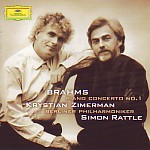Just as the major labels no longer represent the best (or even the most) of what is happening today in classical music recordings, neither do their artists. In fact there are two parallel classical music cultures: the world of concerts, and that of recordings. Even though there are tons more concerts all year round than at any time in the past, the fact is that the concert-going public is still conditioned by the desire to see special events stocked by big names. Record collectors, on the other hand, have long known that the notion that “the cream rises to the top” is utter nonsense, and that there are any number of artists–orchestras, conductors, and soloists–who for whatever reason don’t get top billing, but who on any given day will play better than their more famous colleagues. In short, having major names on a major label is no guarantee of superior musical quality, and it doesn’t matter if those names are Simon Rattle (with or without the “Sir”), the Berlin Philharmonic, or Krystian Zimerman. That’s just the way it is.
It’s fascinating, then, but not at all surprising, to compare this dull, prissy performance to Zimerman’s first recording of the work with Bernstein, which is three minutes slower (54 minutes) than this one but everywhere sounds quicker, more dramatic, and more alive to the music’s expressive turbulence. Take the opening tutti: Bernstein maintains the long line, knows where the music is going, and in the long transition to the second subject sustains the rhythmic tension. Rattle does just the opposite: he hammers away at the opening excitingly, if arguably too heavily, then lets every ounce of energy evaporate as he tip-toes through the softer passages. Zimerman’s initial entrance under Bernstein is a model of what it should be: noble, simple, full of pathos, and gaining in tension as it proceeds. For Rattle, he’s mannered, full of little hesitations that further prevent the necessary shaping of the music into meaningful sentences and paragraphs.
These problems turn out to be emblematic. The start of the slow movement never has sounded so inexpressive, so lacking in warmth and lyrical sensitivity, and with Zimerman fussing about every phrase the result is interminable. In the finale, Rattle and Zimerman sound like two little old ladies locked in a life or death struggle over a game of canasta. They don’t play the music, they poke at it, with kid-gloves. Yes, this movement is audibly based on the finale of Beethoven’s Third Piano Concerto, but Brahms doesn’t need this “faux-classical” gloss. Come to think of it, neither does Beethoven. Compare Zimerman’s phrasing and use of accent under Bernstein to his mincing, emotionally neutered approach under Rattle, never mind the conductor’s near total lack of identification with the idiom.
Mind you, the Bernstein performance is hardly a reference recording for this work either–I’m just citing it for purposes of comparison, to show how even an interpretation as atypical and exaggerated as that one still understood the basics of what the music was trying to do. This dreary, unidiomatic exercise is even further removed from the truly fine performances, such as any of the three Szell recordings (with Curzon, Fleisher, and especially Serkin). And if you like your tempos in this work on the slower side, there’s always Jochum/Gilels, or the more recent Harnoncourt/Buchbinder. All capture far more of the music’s essence than this crew.
Incidentally, Zimerman isn’t helped by sonics that render his tone comparatively shallow and brittle. I find it stunning that two supposedly major artists can turn a work of volcanic passion and youthful fire into a slow-motion squabble over who gets the best seat in the dining room of a retirement home.
































